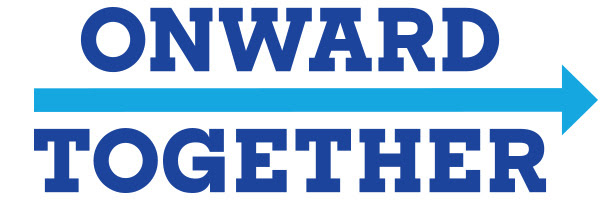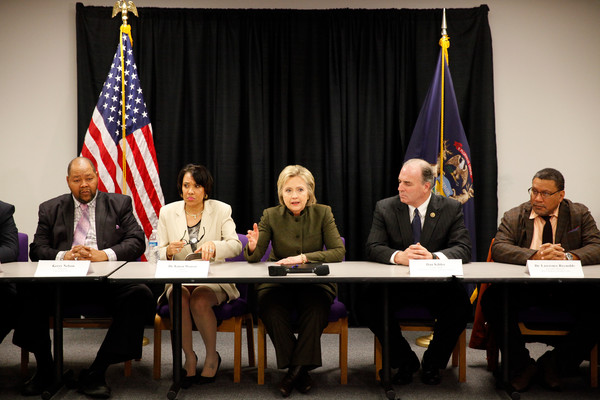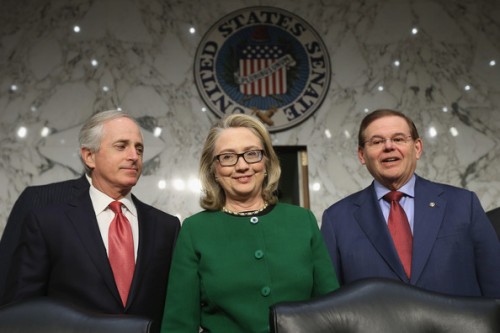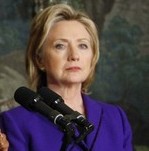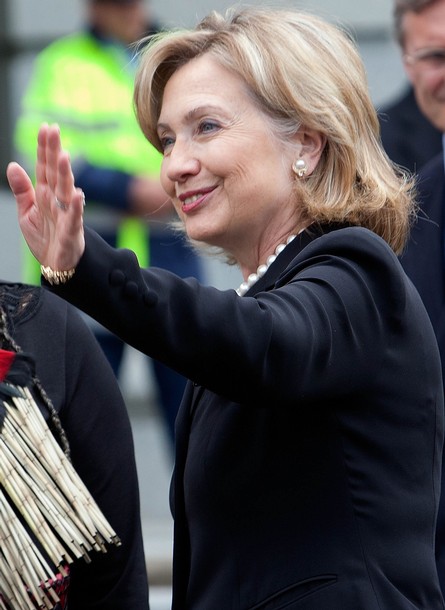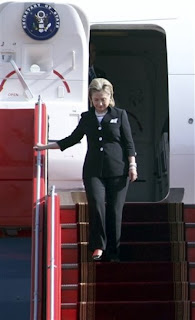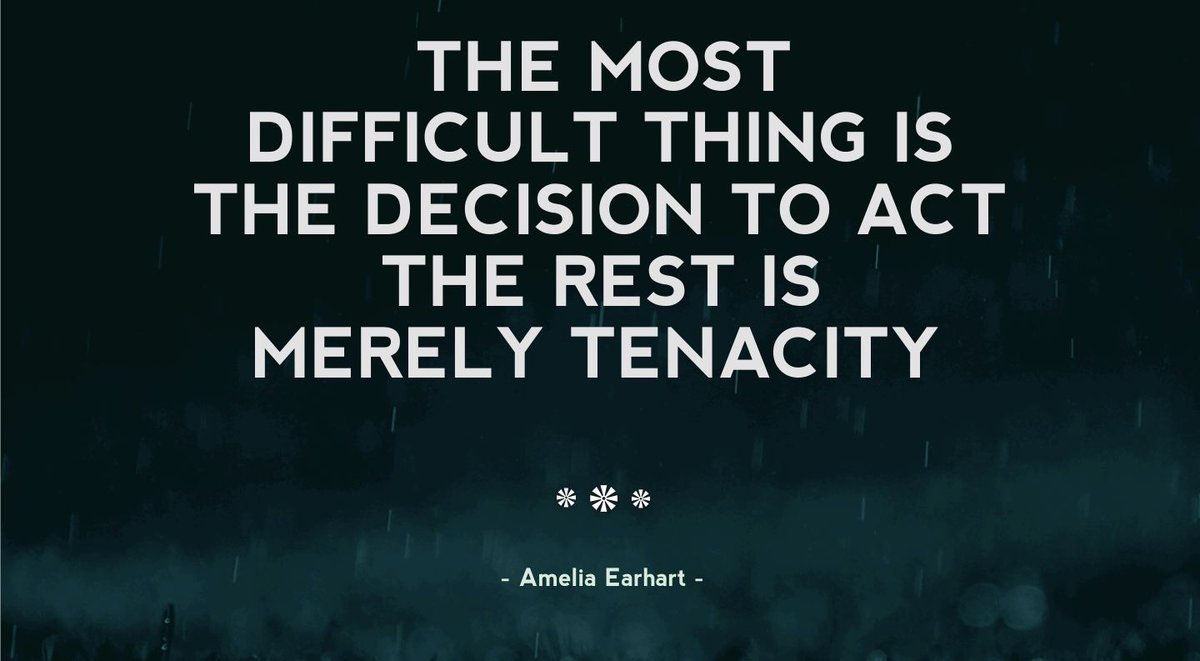Having been negligent about posting here, I now find myself having to catch-up with a whole long trip the intrepid, indomitable and inexhaustible Secretary of State has been on Since March 31. Barely had her feet hit the ground in D.C. after her Mexican excursion, when she once again mounted the “Big Blue Plane” and took off for Europe. Here’s her journey.
She touched down in Amsterdam for a Conference on Afghanistan at The Hague. Here we see her with Dutch Foreign Minister Maxime Verhagen.
Of course she spoke.
Vodpod videos no longer available.Remarks at The International Conference on Afghanistan
Speech
Hillary Rodham Clinton
Secretary of StateThe Hague, NetherlandsMarch 31, 2009
Thank you very much, Minister Verhagen, and Secretary-General Ban Ki-moon, Special Representative Kai Eide, President Karzai, Minister Spanta, friends and colleagues, I want to thank all of you, and especially the United Nations and the Government of the Netherlands for hosting us. I also want to acknowledge the extraordinary contribution of the government and people of the Netherlands to the mission in Afghanistan.
And I want to also acknowledge President Karzai, who fills a critical leadership role in his nation, and whose government helped to shape the shared comprehensive and workable strategy that we are discussing today.
We are here to help the people of Afghanistan prevail against a ruthless enemy who poses a common threat to us all. Afghanistan has always been a crossroads of civilization, and today we find our fate converging in those plains and mountains that are so far and yet so near in this interconnected world to all of us.Thanks to the efforts of the international community, the perpetrators of the horrific terrorist attacks of 9/11 – attacks which killed citizens from more than 90 countries – were driven from Afghanistan, and the Afghan people made a promising start toward a more secure future. But since those first hopeful moments, our collective inability to implement a clear and sustained strategy has allowed violent extremists to regain a foothold in Afghanistan and in Pakistan, and to make the area a nerve center for efforts to spread violence from London to Mumbai.
The range of countries and institutions represented here is a universal recognition that what happens in Afghanistan matters to us all. Our failure to bring peace and progress would be a setback not only to the people of Afghanistan, but to the entire enterprise of collective action in the interest of collective security. Our success, on the other hand, will not only benefit Afghanistan, Pakistan and the region, but also the blueprint for a new diplomacy powered by partnership and premised on shared interests.
So as we recommit ourselves to meet our common challenge with a new strategy, new energy, and new resources, let us be guided by an ancient Afghan proverb, “patience is bitter, but its fruit is sweet.”
The plan I outline today is the product of intensive consultations with nations that have donated troops and support; Afghanistan’s neighbors and international institutions that play a vital role in Afghanistan’s future. The results of these consultations are clear: Our strategy must address the challenge in Afghanistan and Pakistan; it must integrate military and civilian activities and support them with vigorous international diplomacy; and it must rest on the simple premise that while we can and will help, Afghanistan’s future ultimately rests with the Afghan people and their elected government. Security is the essential first step; without it, all else fails. Afghanistan’s army and police will have to take the lead, supported by the International Security Assistance Force.
President Obama has announced that the United States will deploy 17,000 more soldiers and 4,000 additional military trainers to help build up Afghan security forces. The international community will also have to help. We should provide every army and police unit in Afghanistan with an international partner that can provide training and help build capacity. Our collective goal should be standing up an army of at least 134,000 soldiers and a police force of at least 82,000 officers by 2011. These steps will provide the people of Afghanistan with an opportunity to fight and win their own battle for their nation’s future.
We must also help Afghans strengthen their economy and institutions. They know how to rebuild their country, but they need the raw material of progress – roads, public institutions, schools, hospitals, irrigation, and agriculture. The United States is supporting the Government of Afghanistan’s National Development Strategy, the National Solidarity Program, and other initiatives that help Afghans improve their lives and strengthen their own communities.
In consultation with the Afghan Government, we have also identified agriculture – which comprises 70 percent of Afghanistan’s economy – as the key for development. In the 1970s, Afghans exported food to their neighbors. They were often called the garden of Central Asia. Today, this sector lags far behind, and its problems feed the deadly malignancy of the narcotics trade. The United States is focusing its efforts on rural development in provinces near the Afghan-Pakistan border, and we hope that others gathered here will heed the United Nations’ and Afghan Government’s call for help throughout the country with job creation, technical expertise, vocational training, and investments in roads, electrical transmission lines, education, healthcare, and so much else.
As we work with the Afghan people to supply these building blocks of development, we must demand accountability from ourselves and from the Afghan Government. Corruption is a cancer as dangerous to long-term success as the Taliban or al-Qaida. A government that cannot deliver accountable services for its people is a terrorist’s best recruiting tool.
So we must work with bodies such as Afghanistan’s Independent Directorate of Local Governance to ensure that the government at all levels is responsible and transparent. The international community, gathered here, can help by providing auditors and governance experts and training a new generation of civil servants and administrators.
To earn the trust of the Afghan people, the Afghan Government must be legitimate and respected. This requires a successful election in August – one that is open, free, and fair. That can only happen with strong support from the international community. I am, therefore, pleased to announce today that to advance that goal, the United States is committing $40 million to help fund Afghanistan’s upcoming elections.
We must also support efforts by the Government of Afghanistan to separate the extremists of al-Qaida and the Taliban from those who joined their ranks not out of conviction, but out of desperation. This is, in fact, the case for a majority of those fighting with the Taliban. They should be offered an honorable form of reconciliation and reintegration into a peaceful society if they are willing to abandon violence, break with al-Qaida, and support the constitution.
Just as these problems cannot be solved without the Afghan people, they cannot be solved without the help of Afghanistan’s neighbors. Trafficking in narcotics, the spread of violent extremism, economic stagnation, water management, electrification, and irrigation are regional challenges that require regional solutions.
The United Nations has a central role in this effort to coordinate with the Government of Afghanistan and neighbors in the region to make sure that programs are properly prioritized and well focused. We are committed to working with Secretary-General Ban Ki-moon and UN Special Representative Kai Eide to achieve that goal. The United States Special Representative for Afghanistan and Pakistan, Ambassador Richard Holbrooke, will lead American efforts as we move forward, and we welcome the appointment of special representatives by other countries.
If we are to succeed, we will need the help of all the nations present here. As President Obama has pointed out, “the world cannot afford the price that will come due if Afghanistan slides back into chaos.” While there is great temptation to retreat inward in these difficult economic times, it is precisely at such moments that we must redouble our effort. And as we make commitments and contributions, we must ensure they are flexible enough to respond to immediate needs and evolving opportunities. And we all must be willing to coordinate those efforts together.
The challenge we face is difficult, but the opportunity is clear if we move away from the past. All too often in the past seven years, our efforts have been undermanned, under-resourced and underfunded. This goal is achievable. We know we have made progress where we have made adequate investment and worked together.The status of Afghanistan’s army, the lives of women and girls, the country’s education and health systems are far better today than they were in 2001. So if all of us represented here work with the government and people of Afghanistan, we will help not only to secure their future, but ours as well.
Now the principal focus of our discussions today is on Afghanistan, but we cannot hope to succeed if those who seek to reestablish a haven for violence and extremism operate from sanctuaries just across the border. For this reason, our partnership with Pakistan is critical. Together, we all must give Pakistan the tools it needs to fight extremists within its borders.
The Obama Administration has made a strong commitment through our support for legislation called the Kerry-Lugar assistance program. And in a few weeks, we will have a chance to join together in Tokyo for a meeting of the Friends of Democratic Pakistan to provide the support that the Pakistani Government and people need. I urge the nations here today in support of Afghanistan to join us in Tokyo on April 17th to help the people of Pakistan.This effort has already required great sacrifice and it will require more. But in Afghanistan and Pakistan, we face a common threat, a common enemy, and a common task. So let us use today, this conference, to renew and reinvigorate our commitment and our involvement, and to lay a firm foundation for a safer region and a safer world. It is in the interests of all of the people who we represent as we sit around this conference table here in The Hague, and for the kind of world that we wish to help create.
Thank you very much.
Vodpod videos no longer available.Remarks With Dutch Foreign Minister Maxime Verhagen
Remarks
Hillary Rodham Clinton
Secretary of StateThe Hague, NetherlandsMarch 31, 2009
FOREIGN MINISTER VERHAGEN: Madame Secretary, ladies and gentlemen, I want to extend a warm welcome to Secretary Clinton for her visit to the Netherlands, especially because we want to celebrate this year, 400 years of friendship between our two countries. Maybe not in a big tent we are today, but in a place big enough to host all the delegations, all the people who are involved in the future of Afghanistan, and who know that we have a stake in the future of Afghanistan.
The United States and the Netherlands and over 80 other countries and organizations are today meeting in The Hague. We have serious choices to make today. In recent years, NATO and its partners have reduced the threat of terrorists who once found a free haven in Afghanistan and planned attacks on peaceful citizens all over the world. But our work in Afghanistan is still far from done. And Secretary Clinton and I discussed our analyses of the situation and the possible ways forward. And the Netherlands welcomes the outcome of the policy review conducted by the United States.
As the review makes clear, Afghanistan and the region cannot be made safe by military force alone. Diplomacy and development are equally important. Afghan citizens as well as our own citizens need to know what our strategy will be. And I hope today in The Hague, we will start working on a new deal for Afghanistan, a common contract, a new Afghan bond. Achieving respect for human rights, good governance, and social and economic progress are equally important. And I’m sure that the United States and the Netherlands agree that such an Afghan bond must reflect a comprehensive and integrated approach.
In the province of Uruzgan in the south of the country, Dutch diplomats, development workers and military, together with our allies, are learning to do just that. And although the situation is far from irreversible, the number of security incidents is stable and development is picking up. So the Netherlands very much welcomes the American commitment to the training of the Afghan army and police, because this will enable the international community to proceed from implementing to assisting.
In the end, the Afghan people themselves have to be able to provide security and to lead the development of their country. And this conference proves the international community as a whole stays and is wanting to stay committed to the Afghan people.
Madame Secretary, thank you very much and I hope that we will have a very fruitful conference today.
SECRETARY CLINTON: Well, thank you so much, Minister, and I am confident that this conference will make a great difference. And I am very grateful to you personally and to the Dutch Government for making this conference possible in such a short period of time. It was less than a month ago that we first discussed this together in Brussels. And once again, the Dutch Government is at the forefront of the work done on behalf of the global community, and I appreciate that.
You know, as the minister said, Dutch troops are leading the effort in Afghanistan. In Uruzgan Province, as the minister referenced, the success of the policies implemented by the Dutch forces is remarkable. At the center of our efforts is a courageous military commitment by the Dutch people and their government, and it has proven results. It is not a surprise that the three Ds that the Dutch have pursued in their mission in Afghanistan – defense, diplomacy and development – are ones that I personally believe is exactly the right framework.
More than 80 nations and organizations have been brought together here in The Hague. And this conference is critical to our way forward. The Dutch people have played a vital role in advancing security and spreading opportunity far beyond your borders. And this time in particular, our commitment going forward in Afghanistan has great consequences for all of our people, all free people, all people who share the values that the Dutch and the Americans share. I will be speaking later at the conference about the Obama Administration’s strategy for Afghanistan. It is based on collaboration and consultation with our friends and partners.
I looked to the Netherlands not only because of the work that has been done in Afghanistan, but the unsurpassed commitment to fighting poverty and promoting development worldwide. The Netherlands has been a key ally for many decades. The fact that this country is the sixth most generous contributor to international development assistance says volumes about the values of the Dutch people. We will continue to seek your advice and your ideas, your guidance as we work together.
Now the ties between our two countries have a long history. This year, we celebrate the 400th anniversary of Henry Hudson’s legendary voyage which took him from Amsterdam to New Amsterdam. And it marked the beginning of a great chapter in American history and American and Dutch cooperation. I know that the people of New Amsterdam, Minister, a city that is very dear to my heart, have already begun to celebrate this anniversary. I look forward to welcoming you to the United States in a few weeks, where I hope that we can bring even greater attention to the ties that join us and to the values that extend beyond time. And I look forward to many centuries of friendship and partnership between the American and Dutch people.
Thank you very much.
FOREIGN MINISTER VERHAGEN: Thank you.
QUESTION: Madame Secretary (inaudible) after 2010, what do you think can be the role for the Netherlands after that period?
SECRETARY CLINTON: Well, that is, of course, up to the Dutch Government and the Dutch people. But I think the people of the Netherlands should know, certainly from my perspective, the extraordinary contribution and leadership that your mission in Afghanistan has provided. We understand very well the sacrifices, the individual sacrifices as well as the collective ones that such a mission demonstrates. But it has been extraordinarily successful. And in fact, our strategic review is building on many of the ideas and the principles that were brought to bear by the Dutch in Afghanistan. But of course, any decision in the future is up to the people of the Netherlands and their government.
Thank you.


